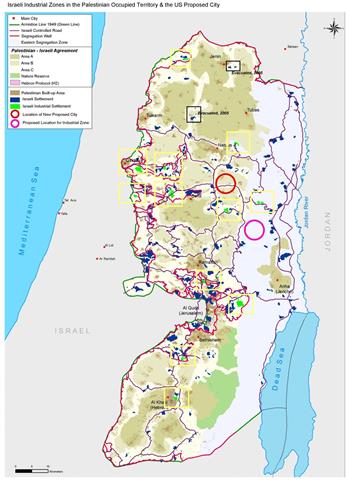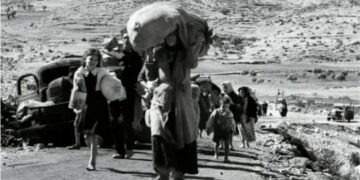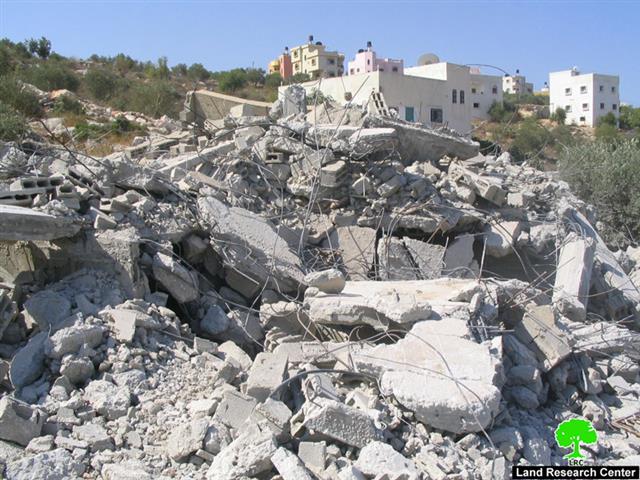The Bush administration has proposed the building of a new Palestinian city in the West Bank that would serve as a place to live for Palestinian workers in a new industrial zone. This is a good idea and a welcome idea. Palestinians, like any other people do greet development and investments. How ever, there are two questions to ask: to what scale in the entire project has anything to do with the Palestinians, for instance, if plans to establish the industrial zone obstructed or failed one or more reasons, would it also apply for the new city, which naturally leads us to the second question who are the real beneficiaries of the industrial zones, but lets keep this question for few more paragraph later to answer.
Since Israel occupied the West Bank in 1967, they worked systematically and methodically to oppress any attempt to develop the Palestinian economy, in fact, Israel spared no effort to ensure the incapacitation of the Palestinian economy as it still in control of import and export outlets (airport, seaport, and land borders), land development in more than 80% of the West Bank and some 25% of Gaza’s. More than that, Israel expropriated and restricted vast areas of the West Bank under the pretext of security and these valuable areas constitute potential locations for future expansion and development of built-up areas or/ and to serve as an pond for industrial, agricultural, and economic development areas. Instead, Israel employed its land expropriation policy to steal land from the Palestinian landowners to give it to the Israeli settlers who illegally resided and invested in industrial zones (restricted only to Israeli industries) in the occupied Palestinian territory. This policy has been condemned by successive American administrations, but that never stopped or at least decelerates the massive flow of financial and military aid to Israel at any time. The US government has said the right thing and done the wrong thing for so long.
After decades of tacitly supporting the development of dozens of Israeli illegal settlements and in the occupied Palestine territory, the US government is finally coming forward with a proposal to build one Palestinian city in the West Bank. It is about time. On the other hand, maybe one should contemplate on what drives such new trend. The destinies of the Palestinians and the Israelis intertwined beyond political issues, they also share economic interests regardless of the fact that Israel has the upper hand on this subject. At least that what the Israelis believe. The fact of the matter, as much as the Palestinians need the work under good sustainable economic conditions and attractive environment for investors to invest in the occupied territory Israel needs a greater numbers of reasonably paid, and skilled labor force, which it can only locate in the West Bank. Previous experiences have cost Israel dearly, when they substituted the Palestinian labor force with import from other countries. Neither the cost, nor the quality of labor was close to their expectation.
The Industrial Zones
In spite of the fact that Israel does not have the right to build industrial zones in Palestine, as it contradicts the international law, they did it anyway. Today, there are 18 Israeli industrial zones location in the occupied West Bank territory. See Map
Building an industrial zone and a new Palestinian city in Palestine is a way to benefit the local population until the PA has a chance to grow into their new role as the governing body in its own sovereign territory. However, as long as Israel presence in the West Bank and Gaza remains under occupation status all efforts made will be futile. Unless the Palestinians has jurisdiction over the territory that will enable them to move around freely without any Israeli obstacles, specially to areas such as the industrial zones, unless Palestinian have domination over the road system, the industrial zones, and with out open-free access to import and export outlets (airport, seaport, and land borders), the industrial zones will become pond to monopolization.
For the second question: who are the real beneficiaries of the industrial zones. The answer is as simple as the Israeli settlements again. The planned industrial zone/s in the occupied Palestinian territory aim to embrace investments with no restrictions; including Israeli investments, which also include those already, located in the West Bank settlements. The windfall of such industrial zone/s to Israeli investors, particularly those in the West Bank is that it will literally grant them unrestricted access to attractive Arab world markets. It will even relieve them the hassle they get marketing their products in some European countries, which stand firmly against selling settlements’ products in their countries.
To give the US the benefit of the doubt with regard to their intention, the fact remains that the greater part of all the good that will come from the new city and the industrial zone will be for the Israelis more than it will be for the Palestinian as intended. To this end, the US should concentrate more on pressuring Israel to discard the collective punishment policy it imposes on the Palestinians with more than 550 different kinds of obstacles set up all over the Occupied Palestinian territory and to ease economic restrictions imposed on Palestinian in terms of movement, import, and export ways.
If such terms comes close to fulfillment, sizable and large scale business enterprises owned by Palestinians’' Diaspora will come to invest as they have tried once to return to be a part of a new and revitalized Palestinian economy, but Israel has made sure to put every obstacle in their way, including denying them entry or it takes their visas away.
Israel’s idea of aid to the Palestinians is to provoke Hamas in order to fight Fatah, then when Hamas gets out of hand, to give weapons to Fatah in order for them to fight Hamas. This is how Israel ‘helps’ the Palestinians. It is and has been Israeli policy for decades. What the United States is trying to do, building a new Palestinian city in Palestine should mark a turning point in the condition of the Palestinian people vis-à-vis the Israelis and the rest of the world. Instead, it could become an aid tool to fortify the settlements and the Israeli occupation.
This idea of creating a new Palestinian city in the occupied territory will benefit the Palestinian people both in the short run and in the long run. In the short run, it will provide jobs and housing to a growing, though poor Palestinian population. In the long run, it will help in the development of the Palestinian infrastructure that will pave the way for a future independent, sovereign, democratic, Palestinian state. Then again, that is the conceptual abstract of the new city. On the other hand, some may see it as a method to set a tailored Palestinian government with an aim to respond to the people’s social and economic needs but not their national rights, and it would finally make it possible for Israel to have normalized relations with the rest of the Arab world.
Prepared by
The Applied Research Institute – Jerusalem
ARIJ













